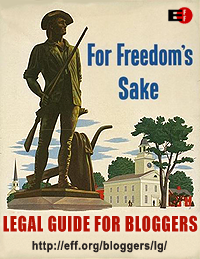
My daughter receives threats and insults from internet bullies every now and then because of her “bombastic” blog entries. I recall the times she was bullied on her entries about speaking english over tagalog, the jologs, the conyos and lastly, her roomie rants. Sometimes I attribute it to jealousy. One day she asked me if [tag]blogger rights[/tag] exist. Her celebrity entry drew the ire of the stage mother that the latter even threatened to file a complaint to the college dean. Nothing materialized of it. Good thing she didn’t file. My husband-lawyer was ready for a countersuit. My daughter has learned to publish blog entries in private or public mode to prevent harassment from internet bullies. It’s one reason she keeps changing her blog domain name. Anyway I found this site that provides a Legal Guide for Bloggers, a collection of blogger-specific FAQs addressing everything from fair use to defamation law to workplace whistle-blowing. These FAQs are limited to the USA laws but remember, most of our websites are hosted in US servers. The Digital Millennium Copyright Act (DMCA) covers US servers. Some can be applicable to the Philippine blogosphere. A historical first in the [tag]Philippine blogosphere[/tag] was that time the PCIJ blog was slapped with a temporary restraining order. Nothing is FREE and dandy in the blogosphere.
Whether you’re a newly minted blogger or a relative old-timer, you’ve been seeing more and more stories pop up every day about bloggers getting in trouble for what they post.
Like all journalists and publishers, bloggers sometimes publish information that other people don’t want published. You might, for example, publish something that someone considers defamatory, republish an AP news story that’s under copyright, or write a lengthy piece detailing the alleged crimes of a candidate for public office.
The difference between you and the reporter at your local newspaper is that in many cases, you may not have the benefit of training or resources to help you determine whether what you’re doing is legal. And on top of that, sometimes knowing the law doesn’t help – in many cases it was written for traditional journalists, and the courts haven’t yet decided how it applies to bloggers.
But here’s the important part: None of this should stop you from blogging. Freedom of speech is the foundation of a functioning democracy, and Internet bullies shouldn’t use the law to stifle legitimate free expression. That’s why EFF created this guide, compiling a number of FAQs designed to help you understand your rights and, if necessary, defend your freedom.
Despite possibilities of internet bullies, don’t let that stop you from blogging. Keep on blogging. Enjoy!

Fighting for Bloggers’ Rights
Speaking of bloggers, take a look at Olga and Cathy‘s blog and their advocacy.
hi noemi.i dropped by at lauren’s site and left a comment re-boracay.i told her that i dread that by the time my little girl grows up,actually liking spending time with parents would be considered uncool, silly even.Reading her blog about why she was raring to go to boracay with her family assured me that my fear is unfounded. Nasa pagpapalaki pala talaga, and by all indications, you guys have done a great job.congratulations!
Lemon: Thanks ! I thought that way too and even got depressed thinking about it. But just enjoy your little one and leave the future worries when it comes. There are so many ways that girls can bond with their moms. I find shopping, going to the salon as the best times . Making dinner at home is also a bonding activity. You will know when the right time to let go a little. It wasn’t easy letting go especially during the early college years. There will be a phase that going with parents will be uncool but they will get over that. In fact, this afternoon, my daughter wants to be at home with us. I thought she’d prefer the dorm life.
I hope I will.Thanks for the info. on blogger’s rights
Thank you for the link Ms Noemi 🙂 I had the chance to read that entry in Lauren’s blog before she removed it. I think it’s unfair that the mom planned to file a complaint. I understand that moms want to protect their children, but aren’t they a celebrity? Shouldn’t they accept that people would want to make opinions on them?
Maybe I need to be a “celebrity” before I can understand them. And besides, we Filipinos are pretty sensitive. 😀 E-drama is everywhere! Even Pacific Plan holders have a blog where they post their opinions online!
By the way, my Marketing prof showed pictures of 168 mall and Mall of Asia from your photo album!! I recognized the picture of Imelda Marcos in 168 in one of his slides 🙂
Jessica: The mother had no basis because Lauren’s entry was based from another site. As moms we can’t always be overprotective especially if they are in college. Nakakahiya na. I think as a celebrity, the mom only wants a clean image of her daughter. Maybe I know your marketing prof. How cool !